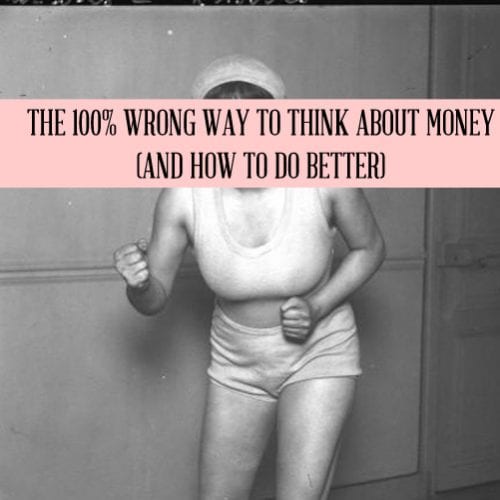
When I was in college and running a company, I considered dropping out. Bill Gates did, right?
In retrospect, I wouldn’t have known what to do with myself. Dealing with adult life on your own for the first time is maybe not super-compatible with managing a team of other people.
But what about that feeling that you’re missing the boat, and that other, younger, snappier people are getting ahead?
Let’s see a letter from a young reader who is already feeling the OMG-younger-people-are-getting-ahead-of-me pressure — although all of us can be susceptible to it.
Firstly, thanks for writing articles that say “ITS OKAY” and “JUST DO IT” to everything that I’ve been hiding in my mind and secretly dreaming about since I was 13-years-old.
Secondly, have any advice for a college freshman who doesn’t know whether or not to continue her education? I could literally drop out and do what I wanted to do (within the realms of fashion/styling, writing for publications, networking and being a general badass and perhaps starting my own business).
Yet, there are a lot of factors that go into that. Like money. And parents. Etc. Because, even though Tavi G. started Rookie before I had my first boyfriend, I’m still 18. S.O.S.!
I’ve got a lot of questions in my inbox, but I think you had me at “S.O.S.” Good question! And thanks for the compliments.
So the main question seems to be whether you should stay in school.
First, let’s talk finances. Are you racking up huge debts? Are you at some kind of cheap local school where you can mostly pay for your education with a patchwork of work-study, Pell grants, and family contributions? Are your parents picking up the whole tab?
I found it hard to think clearly about money when I was in school, even when I was running a pretty successful business (involving math!) Since the sticker cost of Dartmouth was more than my family even made (I may be exaggerating, but it was a lot), the numbers just didn’t seem like real money. Like if someone sued me for a trillion dollars, I’d be a lot less scared than if someone sued me for $50,000. Having to pay $50,000 would really damage my whole situation. Having to pay a trillion dollars is just hilarious. WTF does that even mean?
It’s hard to even contemplate large sums of money when you make $8 an hour at the campus library and feel guilty about buying a $4.50 sandwich that’s not on your meal plan.
So, how about this:
If you’re racking up a lot of debts and you think you want to go into a freelance or creative career, that’s one big reason to think about dropping out. You could always go back to a cheaper school later, if you want to. You could also pursue a less expensive vocational program (massage therapy, personal training, nail tech — or, you know, Ruby on Rails) in order to give you a steady source of income while you launch whatever it is you want to launch. Check out this article by Haley Mlotek about business lessons learned in beauty school, and this interview with Glennis McCarthy about training as a nail tech and opening a nail art business in LA.
If the cost of school is reasonable — mine was, due to hefty financial aid from both Dartmouth and private scholarships — then please think about what you can do while still attending school. Many professors and administrators — even some really square-seeming ones — are actually in their jobs because they like and want to help young people! Especially young people with their own exciting plans and ideas. College gives you access to a network of helpful adults. Of course, I didn’t realize this when I was actually in college (see Bullish: What I Wish I’d Known When I Was 18), but I’m telling you now.
If your costs are reasonable, also keep in mind that most traditional, residential universities are little villages of resources that are actually pretty awesome. When I was in college, I tried rock climbing and trail riding (the kind on an actual horse!), and took a fitness instructor training class that cost me nothing or next to nothing. And that was just through the fitness center.
I also had unlimited free printing and internet access and could buy student versions of expensive software. All my part-time employees also had free internet and their own copies of software that I therefore did not have to provide for them. My health care was not only taken care of, it was taken care of with minimal waiting and within walking distance, and all the ladyparts doctors were super-cool feminists. You could start some kind of weird club or project and get other people involved without worrying about money — not only does the student who makes the website not expect to get paid, the Student Activities board sometimes even gives you a grant! Sometimes clubs get funding to go to conferences!
If your campus also has a business school, there’s a good chance you could arrange to sit in on some classes for free (go outside the college’s official auditing policy and just tell the professor that you’re an undergrad wanting to start her own business, and ask if you can informally attend lectures). If not, the business school will certainly have, at very least, guest speakers and other events open to anyone. Show up to enough of those, maybe you can get involved in a startup with some b-school students. You can be the cool, artsy one.
If you are in an underfunded or commuter college that doesn’t offer these benefits, then that’s different. And if you’re paying too much for these benefits, then again, maybe you’re in the wrong place. These benefits are, after all, not the main point of college.
Personally, I was able to major in something that other people seemed to find impressive but that was also easy for me. I read philosophy and wrote papers! In class, we argued! Sometimes it was so easy it felt like cheating. I mean, if you get to the PhD level in philosophy, you have to read texts in German or Ancient Greek, or both. But my undergrad degree was not all that demanding for me. And people who majored in economics because their parents told them it would help them get good jobs have often looked wistfully at me, wishing they had spent four years contemplating the meaning of life (that’s really not what you do in a philosophy class, but if finance people want to think I know the meaning of life, I’ll go with it).
If your parents are paying in full, first let’s ask whether this is a hardship for them. If they’re really sacrificing to send you to a school you don’t even want to go to, then you should have a serious talk with them. Maybe they could pay less for you to do a training program and/or launch a business, and then everybody’s happy. Of course, if Mom and Dad are your investors, there will be hella strings attached. (If your business doesn’t take off in two years, you agree to go get that teaching certificate they suggested, for instance.) There are strings attached with all investors, though.
If your parents are paying in full and it’s not a hardship for them, I’d suggest staying in school, majoring in something interesting and not too challenging for you, and really, really working your college resources while you write for publications, intern in the fashion business, or whatever else you can fit into a jam-packed schedule while your classmates are boozing it up and running naked across football fields. You don’t have to worry about rent, transportation, or food, your classes take up half-days at most, and you’re not going into debt? Make a business plan for your life, suck up the academic requirements you don’t care for, and enjoy your privileged position.
I might also point out that certain things are pretty hard to do at 18, even though you’re a legal adult. You will have a hard time getting an apartment lease unless your parents co-sign. You have no credit, right? No business loans for you. Many people will not trust or hire you because you are still a teenager and because you have not yet demonstrated that you can commit to something, which is one purpose college serves. If you showed up to class for four years and managed to conform well enough to a variety of professors’ requirements, I am much more likely to believe that you will show up to work and take direction from a boss.
(NOTE: Please do get one of those college student credit cards. Hold out for one with no annual fee. Use it for small purchases and pay it off every month. I’m serious. Don’t fuck this up. Our credit system in America is terrible and unfair, yes. But this is how it is. I have a friend who makes over $100,000 a year running her own business and has never had a credit card. She’s 30 and cannot get approved for any credit card at all. She has never been in debt and is great at making money, but the database that decides who in this country gets a loan or a mortgage has decided she is permanently off the grid. You need to get into the credit system when they let you in — in college — and don’t fuck it up.)
A bit more on the benefits of having a degree, even if you majored in something impractical and graduated with sub-stellar grades:
I came from more of a blue-collar background (as I wrote about in Bullish: Social Class in the Office), and that probably has something to do with the fact that — now that I think about it — I have been in no fewer than three long-term relationships with guys who didn’t go to college. While each of these guys was doing his own thing and pursuing a creative career, it has come up more than once that not having a college degree shuts out certain opportunities that it would be nice to have when one falls on hard times.
I mean that when you’re starting a business and decide to get a part-time job to keep the bills paid, you’re going to be shut out of most anything that happens in an office, which means that the part-time jobs you can get are more likely involve working on your feet. That’s cool when you’re 23, and not so cool if you find yourself a tired, struggling single mom whose fashion line hasn’t taken off yet, or if you get sick and just need a way to take care of yourself until hopefully you get your mojo back.
Of course you can write for publications without having a college degree. But even really great freelance writers don’t make much (see Bullish: Should You Do What You Love?). You know who gets paid good money to blog? People who work for big corporations. Some of them write blog posts about, say, yogurt. They run little yogurt contests on the dairy marketing blog that’s part of the food products division of the international conglomerate. They get matching 401K contributions for this. Money does not flow in proportion to talent or quality. More money comes out of organizations that have more money.
So, if you go into a career without a degree of any kind, you are really banking on your creative career working out, and on never needing to get back into mainstream white-collar employment.
That said, my oft-written-about best friend Molly Crabapple runs an art empire and recently spoke at Harvard — and she’s an art school dropout, which actually sounds pretty great in a bio. Haley, who works with me at GetBullish when she’s not publishing a magazine, is a beauty school dropout, which also sounds great in a bio.
Almost everybody also has an Uncle Dan who sometimes fixes cars but mostly just calls and asks for “loans”, and was in a band in 1983, around the time he dropped out of college.
So … make sure you’re not an Uncle Dan. And be prepared for the kind of career where you work more than anyone else, with very little help or direction from others. Dropping out of college will not make anything easy. But if you’re into Bullish, I’m assuming you’re not looking for easy.
Finally: As for Tavi, you’ve just gotten your first taste of something that’s going to happen repeatedly, and more frequently, as you get older. People younger than you are going to do shit you wish you had done at their age.
I remember running my company at age 20 or so, and reading about guys who were still in college (or who had dropped out) selling their startups. My company was pretty cool and all, but I was billing clients by the hour. I didn’t know how to run the kind of company you could sell or take public. After graduation, as my company began its slow and painful death spiral, I found articles about teen phenoms running businesses in their dorm rooms rather depressing.
It would be pretty trite to tell you not to compare yourself with other people. It is inevitable to compare yourself with other people, and a lot of people who are just shitty people would have benefitted from spending more time comparing themselves to, say, Eleanor Roosevelt.
So instead, I’ll say this: People don’t care what age you were when you did something.
If you do something incredible when you’re really, really young, you get a sort of circus-sideshow type of attention — not “This is a great novel,” but “Wow, a seventeen year old wrote a novel!” The novel gets short shrift. If you write that novel when you’re 26 or 31 or 39, the novel can have the attention because you’re not such a freakshow.
Personally, I enjoy a good, weird origin story about an entrepreneur — “After eight years hiking along the Amazon and indulging in indigenous psychedelics with local tribes, so-and-so moved in with his brother in London and began to toss around the idea of starting an airline … with a sense of adventure.”
Don’t concern yourself with the accomplishments of people younger than you. Worry too much about it and you become that middle-aged lady complaining that all her doctors look like children.
Do great things in your own time. Worry about the things you make being truly great, and as many people knowing about them as possible. You’ve got plenty of time.








